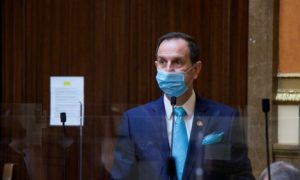Here are the highlights from the Fifth Week of the Utah Legislature.
House Third Reading Calendar Almost Emptied
This session has been a surprisingly productive one so far. On Friday, we came close to finishing all the bills on the House Third Reading Calendar, which is a very unusual situation to be in. This is encouraging because it means that we will likely have time to hear more bills in the last two weeks of the session than we usually do, meaning that more ideas will be heard and debated on the House floor. Whether or not I personally agree with the bills themselves, it is beneficial for the Legislature to have conversations on these important topics. Hopefully the Senate will be able match the House’s efficiency so that as many bills as possible can get the attention they deserve.
Noteworthy Issues
Government Transparency
This year I sponsored HB140 in an attempt to increase transparency in the process by which the Legislature spends taxpayers’ money. The effect of this bill will be that whenever the State of Utah receives more income tax revenue than was expected due to a change in federal tax policy, this money will be placed in a restricted account and will only be available to spend after a vote by the entire Legislature who will at the same time have to decide whether to make the tax increase permanent or give the money back to Utah’s citizens.
When the Trump administration passed its Tax Cuts and Jobs Act of 2017, the dependent exemption was also removed from Utah tax policy, resulting in a large tax increase that the Legislature did not vote on. Because there was no policy in place to regulate this extra money, it was allocated to various projects. Since then, Utah has collected several hundred million dollars in surplus income tax revenue from that tax increase. If the provisions in HB140 had been in place, the Legislature would have had to have to publicly vote to make the tax increase permanent or return the money through an adjustment to the state tax code. This bill passed its House vote this week, so now it is up to the Senate to decide whether or not to continue the conversation on transparency and accountability.
Executive Overreach
Many people have written to me expressing their concerns with SB195, Emergency Response Amendments. I want to make sure that we are clear about the point of this bill. This bill has been the result of negotiations between the legislative and executive branch. I am pleased that Governor Cox understands why changes are needed. While the bill in its current form may not entirely solve the problem of executive overreach during emergencies, it will allow the Legislature the power to terminate executive orders if they feel said orders are unnecessary and curbs emergency powers in other ways. I understand that many of you are concerned about the Executive branch’s response to the COVID-19 pandemic and I share those concerns. It will take time and a significant amount of legislation to ensure that the Executive branch is kept in check in future emergency situations, but this bill is a step in the right direction.
Deregulation
In my weekly town hall updates, it was brought to my attention that many of my constituents are interested in knowing which bills are being run this year that remove unnecessary and outdated sections from our law. This session, there are several bills that pull back on outdated or unnecessary laws. One in particular comes to mind: HB287 only strikes out existing code and adds no new language. This bill removes outdated and sexist restrictions on the ability of nurse practitioners to own and manage their own medical clinics. My intern and I are watching for other examples of bills that repeal or pull back on outdated and unnecessary laws.
My Bills – A Status Update
A complete list of my bills is available to view online along with the current status of each.
Here is a summary of those that are actively progressing through the process.
So far, six of my bills have made it through the Senate and are off to the governor’s desk for his signature. These are
- HB11 allows for responsible reallocation of excess funds in the Department of Human Services
- HB40 removes an inconsistency in tax legislation pertaining to alcohol licenses
- HJR1 congratulates the Utah Medicaid Accountable Care program on its success over the past 10 years
- HB202 prevents healthcare providers from falsely claiming to be part of a consumer’s insurance provider network
- HB139 ensures that government agencies hire employees based on competency rather than just education
- HB118 (which Representative Shipp took over for me) has also passed its final vote and is waiting for the governor’s signature.
HB125 Intergenerational Poverty Solution passed its House vote and is waiting to be assigned to a Senate committee.
HB140 Income Tax Revenue Amendments passed its House vote and will now proceed to the Senate for further debate.
HB178 Pharmacy Practice Modifications passed its Senate committee hearing and is waiting to be heard on the Senate floor.
HB190 Interstate Compact on Curing Diseases is waiting to be assigned to a Senate committee.
HB211 Initiatives and Referenda Amendments passed out of the House and will now be heard by the Senate Government Operations and Political Subdivisions Committee.


